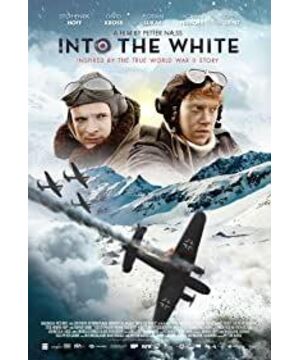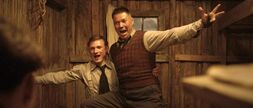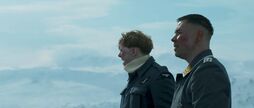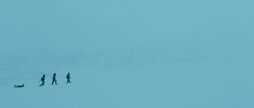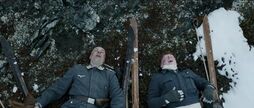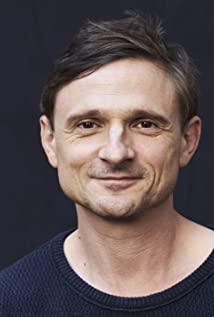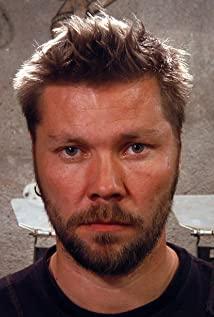The film is adapted from a real event. The British and German fighter planes shot down each other over Norway. From the wreckage of the German plane, it can be identified as a He111. ) type fighter-bomber, which is a single-engine two-seater carrier-based aircraft, it is no wonder that the British army set in the film has only two people: a pilot and a machine gunner. The truth is that Skua shot down a He111 bomber ordered to bomb the Royal Navy cruiser HMS Flamingo and made a forced landing. The film was adapted as the British and German sides would shoot each other down.
The two surviving British soldiers and three German soldiers took refuge in an abandoned hunting hut after trekking in the snow for a while. At first, the two sides were hostile and ridiculed, but under extreme circumstances, they were grasshoppers on the same rope. They communicated, cooperated and helped each other carefully while guarding. There was no other choice. This kind of development is not abrupt. It was decided from the moment the German pilot who found the cabin first allowed two unarmed Britons to enter the house and share food, to the end, standing on the snowy wasteland in their military uniforms, watching the magnificent aurora and singing . . Although the traces of literary and artistic creation in this scene can no longer be obvious, as the focus of the whole drama to show the conflict, the process of the two sides from hostility to helping each other and establishing a friendship of sharing weal and woe is quite healing, and anger and ridicule have also turned into friendly teasing and comforting (The director even inserted some jokes intimately). Think about the fact that this kind of thing happened between Britain and Germany in the warring countries of World War II, and there is no sense of disobedience between Britain and Germany. The face of gold is suspected and some counter-examples are selectively ignored, but after all, there is still a basis. The historical relationship between Britain and Germany makes both sides regard each other as equal opponents and abide by the Geneva Convention, so there is no "routine" to greet enemy pilots who are parachuting with bullets in the Pacific battlefield and the Eastern Front battlefield.
It is precisely because of this level of awareness that the film does not have any high-level feelings about soul redemption, the cruelty of war, and the greatness of human nature. The pilots on both sides had no reason to hate each other and kill each other. The ice and snow trapped them in the cabin and isolated the war for a short time, but the shadow of the war was still in their hearts and lingering in their minds. They complained about each other, wanted to subdue each other but compromised with each other, and even found peace of mind in this isolated snowfield. Many details are very interesting, such as the small compass can be used for disinfection, but also caused a war of words between the two sides. In general, the plot of the film develops peacefully and naturally, without being pretentious or deliberate, and it has the meaning of listening to thunder in a silent place.
In addition to the contradictions and conflicts, there are five outstanding personalities of the protagonists that promote the plot. Rupert Grint gave a wonderful performance that was completely different from Ron. The machine gunner Smith he played was a frank and easy-going big boy with superb shooting skills, love of life, courage and fearlessness. Enthusiasm and quest for freedom impress Karl-Heinz Strunk, a taciturn German officer; his companion and commander: the pilot Captain Davenport is clearly from British high society (in the lines he and his mother have No need to cook), calm and shrewd, even if captured, still maintains elegance and demeanor, but also a little black-bellied and arrogant, in the passive situation of lack of weapons and being controlled by others, he developed a strategy of superficial obedience, and secretly and quietly provoking opponents, Successfully captured the Ruger P08, and when the German lieutenant pointed his pistol at the British opponent and announced that you were prisoners, Davenport leaned lazily on the simple bed with a smile: "According to the Geneva Convention, we should enjoy the bed. , three meals, and the treatment of sports facilities", so the Germans were so angry and helpless that they were instructed to cook by the captives in their hands. After the meal, the Germans asked them to wash the dishes, and Davenport said that they could not go beyond what you have drawn. The 38th line, the kitchen is on your side, we are powerless. His verbal counterattacks that were neither humble nor arrogant were wonderful. Later, he became the backbone of the five people, calmly instructing everyone to perform a simple amputation operation for the wounded German armorer Joseph; : For the first time in his life, the Germans were forced to cut down the load-bearing columns of the wooden house with a pistol for firewood. However, this occasional lack of two added more charm to the characters.
On the German side, Lieutenant Horst Schopis was serious and rigorous in his work and performed his duties with due diligence, just like a standard template for German officers. After a failed marriage, Strunk was upright and loyal. He chose the army because he was unwilling to inherit the rich family business. His death was really embarrassing. Typical image of German youth: radical and reckless, with Nazi tendencies. After the plane crash, he did not forget to carry "Mein Kampf" with the autograph of the Führer. Here is a detail worth mentioning. After the two sides cooperated to complete Joseph's amputation, Schopis While Joseph was in a coma, he threw this Mein Kampf into the fire. Some critics said it meant he abandoned his old beliefs. I think it was just his way of showing friendliness. This small gesture symbolized It is a complete reconciliation between the two rival camps, except for Joseph, Schopis and Strunk's behavior and words show that they have no interest in political parties, and at the beginning of the film they use a subtle look at the red book when they first see it. And the eyes showed disdain for the Nazis and the Fuhrer.
In the end, the interaction between Davenport and Schopis is very cute. From the conflict to the cover for each other, the eyes of the Norwegian military are in front of the Norwegian military.
View more about Into the White reviews


